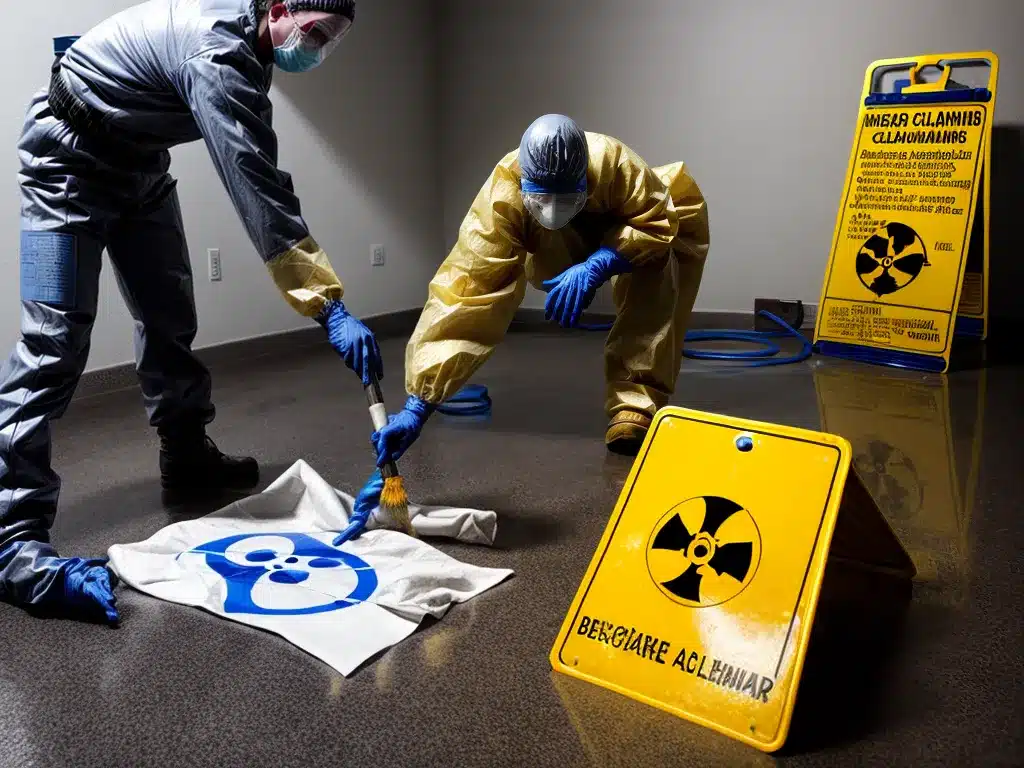Introduction
Biohazard cleanup involves the removal of potentially infectious materials that may pose a threat to human health. Proper cleanup and disposal of biohazards is crucial to prevent the spread of dangerous diseases. In this article, I will provide an in-depth look at biohazard cleanup and outline key information you need to know about this important process.
Types of Biohazards
There are several categories of biohazards that may require professional cleanup services:
Bodily Fluids
- Blood, vomit, feces, urine, and other bodily fluids can harbor pathogens. Any areas contaminated with significant amounts of bodily fluids should be considered biohazards.
Medical Waste
- Needles, syringes, IV tubing, and other medical waste may be contaminated with bodily fluids or infectious agents. They require proper disposal as biohazardous waste.
Mold
- Mold can trigger allergic reactions and may release toxins. Large mold growth due to flooding or water damage presents a biohazard.
Crime Scenes
- Blood or bodily fluids at a crime scene may be contaminated with bloodborne pathogens and require biohazard remediation.
Death Scenes
- Unattended deaths may result in decomposition and require cleanup to restore safety.
Dangers of Improper Cleanup
Attempting DIY biohazard cleanup or using unqualified personnel can spread infection. Hazards include:
-
Exposure to pathogens – Viruses, bacteria, and fungi can cause serious illness. Bloodborne pathogens like HIV, hepatitis B, and hepatitis C can lead to chronic infection.
-
Cross-contamination – Infectious agents can spread to other surfaces, items, and rooms in the home or workplace.
-
Infection of cleanup personnel – Improper protective gear or technique can lead to disease transmission.
-
Environmental contamination – Improperly disposed waste can contaminate groundwater and soil.
When to Call a Professional Service
I recommend contacting a professional biohazard cleanup company for:
- Large spills of bodily fluids and blood (over 10 square feet)
- Unattended deaths, decomposition, or hoarding situations
- Extensive mold growth from water damage
- Any biohazard exposure with a risk of infection
Professional training and grade-specific equipment is necessary for proper cleanup and disinfection of these situations. Attempting the cleanup as a non-professional exposes people to unnecessary risk.
The Biohazard Cleanup Process
Reputable biohazard remediation companies use defined protocols to thoroughly clean and restore safety. The process includes:
1. Initial Site Assessment
- Identify types of biohazards
- Determine scope of affected areas
- Evaluate degree of contamination
2. Personal Protective Equipment (PPE)
- Full-body hazmat suits
- Respirators
- Eye protection
- Two pairs of gloves
3. Isolation and Containment
- Seal off affected rooms or areas
- Block HVAC vents
4. Removal and Disposal
- Remove gross filth and obvious biohazards
- Properly collect, label, transport, and dispose of waste
5. Cleaning and Disinfection
- Scrub areas with disinfectant cleaners
- Use antimicrobial fogging or misting
- Treat carpets/fabrics with disinfectants
6. Odor Treatment
- Apply enzyme neutralizers to break down odors
- Thermal fog with deodorizers
7. Post-treatment Testing
- Swab sites and send for laboratory testing
- May test airflow for contamination
8. Clearance and Certification
- Issue certificate of sanitization
- Confirm site meets standards for re-occupancy
Following these protocols minimizes the risk of spreading contamination.
Questions to Ask Your Biohazard Cleanup Company
When selecting a biohazard remediation firm, I recommend asking these key questions:
- Are you licensed for hazardous materials cleanup in this state?
- Do you comply with OSHA’s Bloodborne Pathogen Standards?
- What types of PPE do your technicians use?
- What chemicals or disinfectants do you use to sanitize affected areas? Are they EPA-registered?
- What protocols do you follow for biohazard waste disposal?
- Will on-site testing be done after cleanup is complete?
- Do you provide any guarantees or certifications of sanitization?
A reputable company will be able to provide documentation, training certificates, and answer these questions to give you confidence in their procedures.
Costs of Biohazard Cleanup
Professional biohazard remediation services range from $300 to $1500 or more, depending on factors like:
- Type of biohazard
- Surface area and severity of contamination
- Level of PPE required
- Need for structural repairs or replacements
- Travel distance to site
Large crime scenes, hoarding remediation, or major structural repairs will fall at the higher end of this range. Minor cleanups may cost toward the lower end. Expect to pay more for emergency rapid response service.
Conclusion
Biohazard situations should only be handled by qualified professionals trained in infection control protocols. Blood, bodily fluids, and mold can harbor dangerous pathogens and easily spread contamination if not properly cleaned. A professional service will isolate affected areas, thoroughly disinfect all surfaces, and dispose of waste safely. This provides peace of mind that the site has been restored to a sanitary condition. When faced with any sizable biohazard incident, it is wise to call an established firm specializing in this type of remediation.







